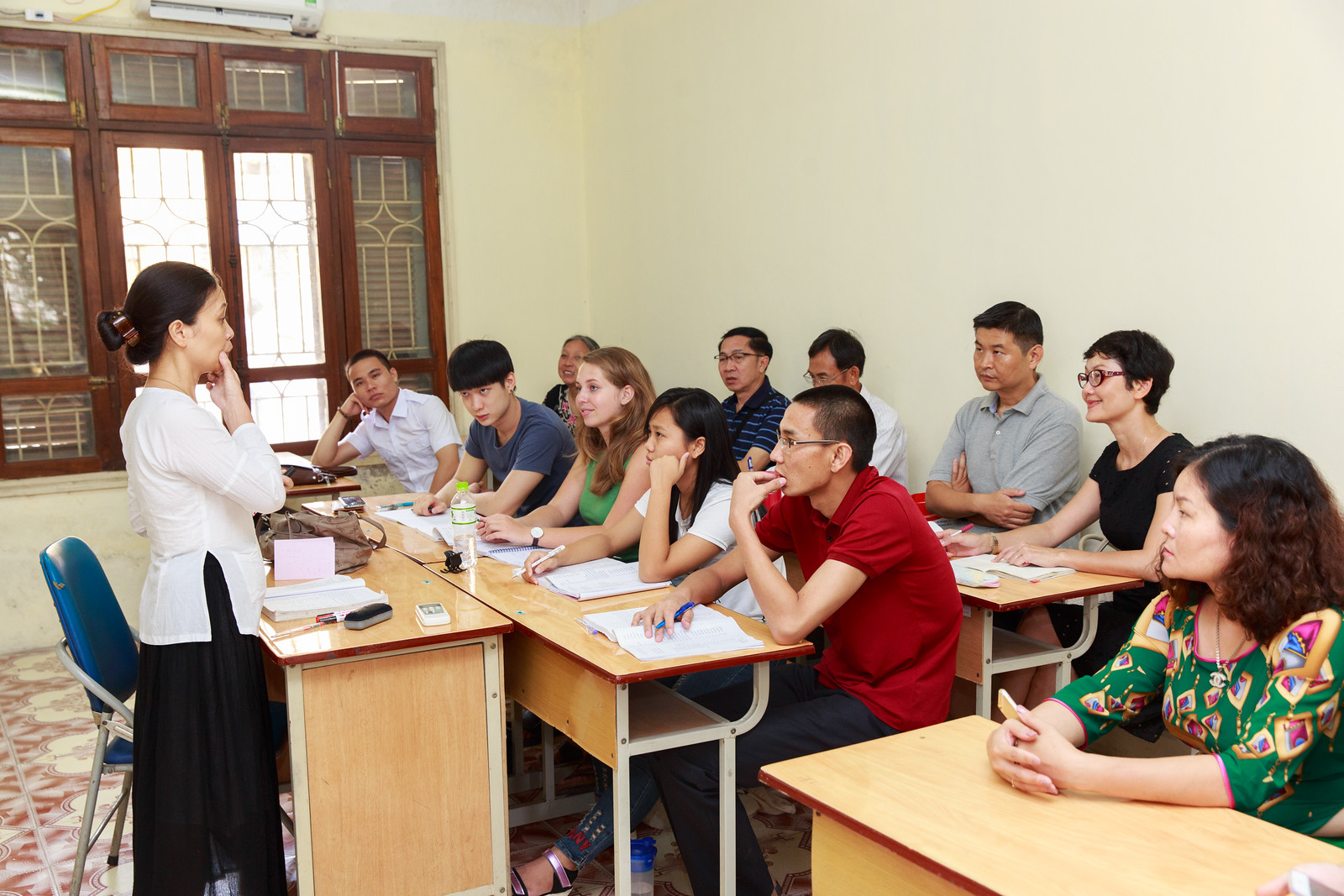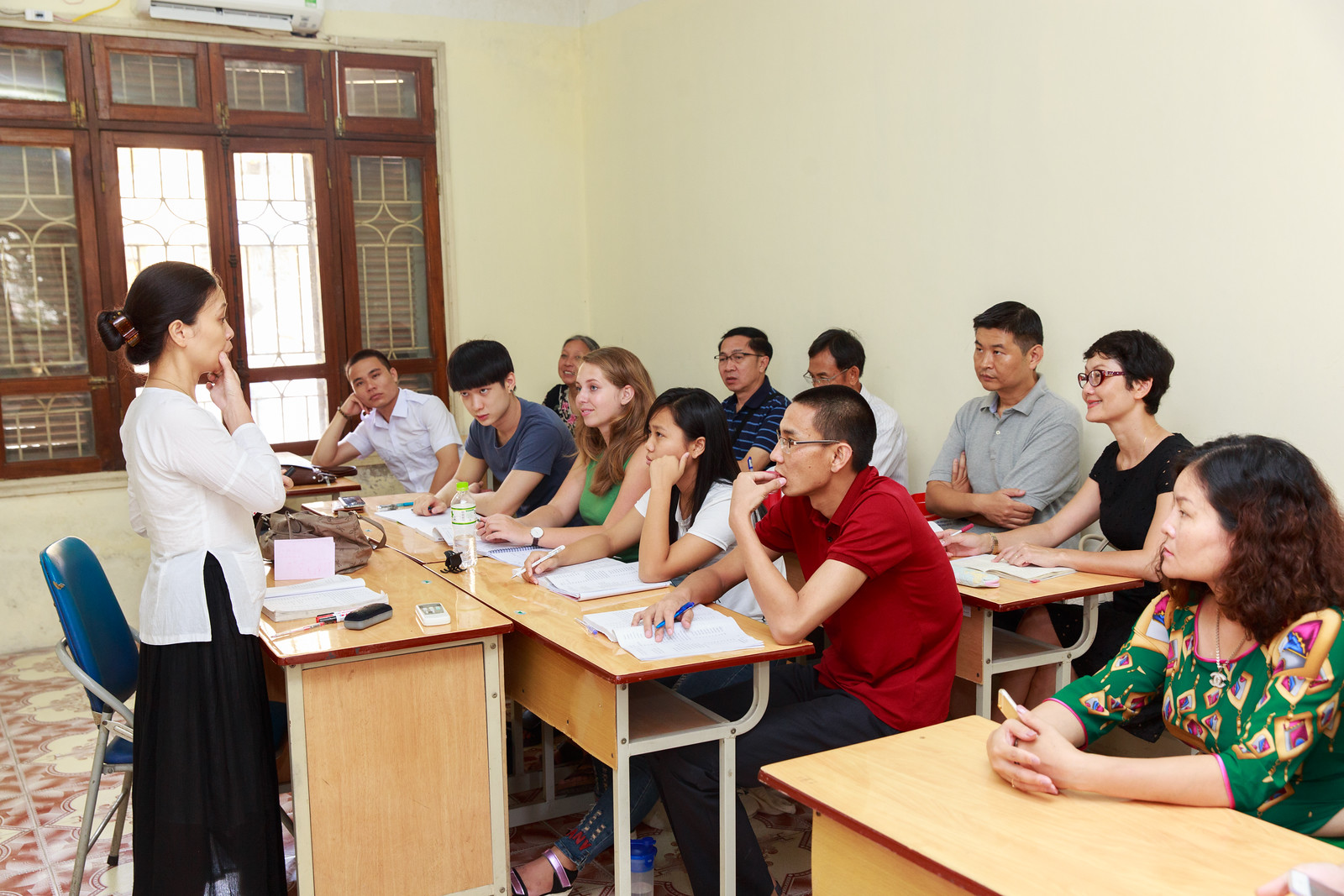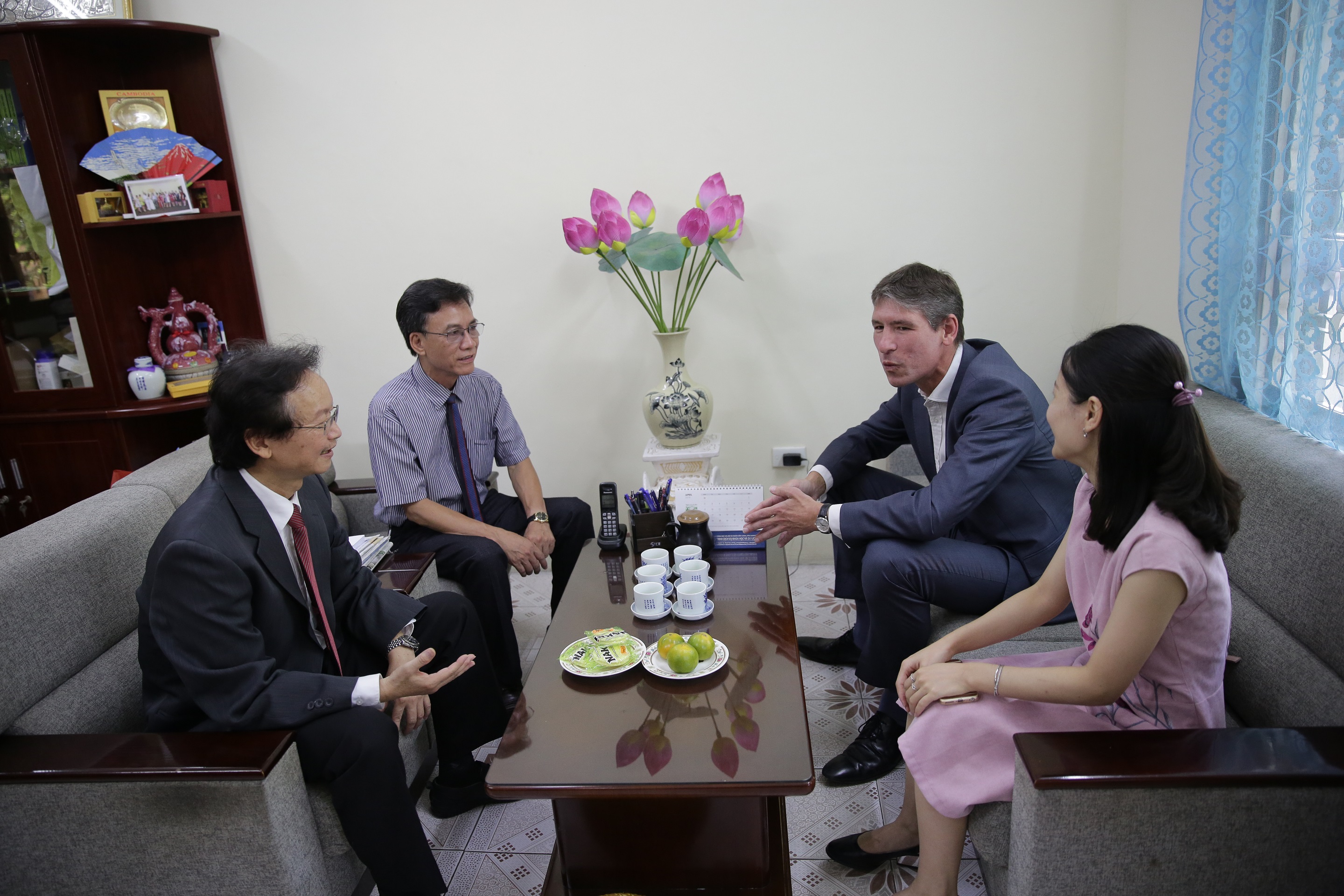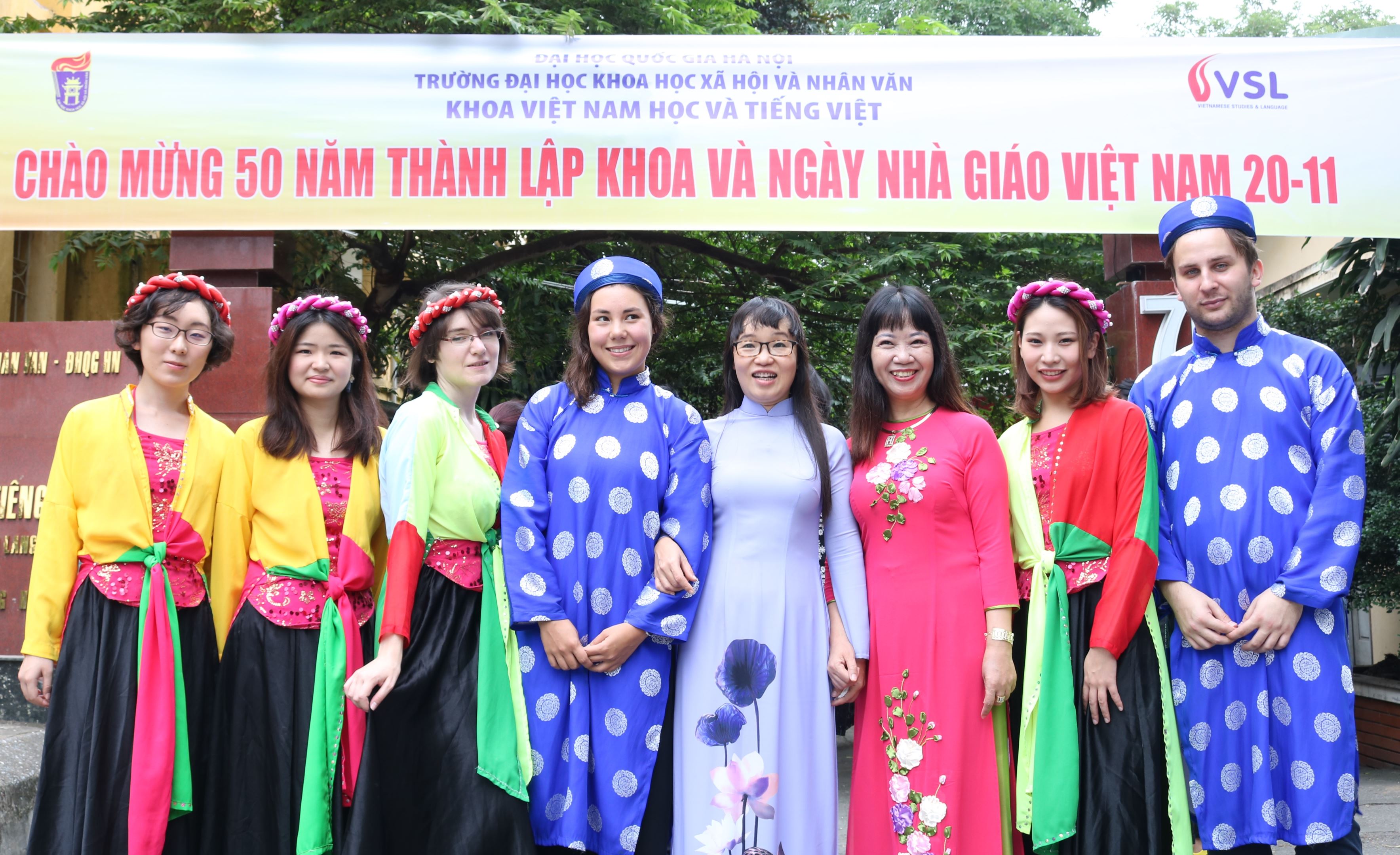
Teaching Vietnamese: A new career choice for many young people.
About a decade ago, when diplomatic relations between South Korea and Vietnam warmed, many Korean experts and businesspeople wanted to learn Vietnamese to seek investment and development opportunities in Vietnam. As a student in Seoul at the time, I was fortunate enough to be introduced by a close friend to a job teaching Vietnamese to Korean experts and businesspeople who would be coming to Vietnam for work. While my American classmate earned about $30 an hour tutoring English for Koreans, my Vietnamese tutoring fee was double that. The reason was simple: finding a Vietnamese teacher in South Korea was much harder than finding an English teacher. Thanks to that regular Vietnamese tutoring job, I was able to get through the difficult years of studying because my scholarship wasn't enough to cover the basic needs of a family with young children in Seoul. Mentally, learning Vietnamese helped me feel more confident in a foreign country. I deeply feel that many wealthy Korean businessmen are striving every day to conquer a market nearly twice the size of their own population, by diligently learning Vietnamese from me. Vietnamese is not only beautiful and sacred in my subconscious, but for me, it is also a lifeline for making a living.

Teaching Vietnamese to foreigners is becoming an attractive profession for young people because of its good income.
Recently, teaching Vietnamese to foreigners has become increasingly popular in its homeland, following the influx of foreign investors. Hoai recounts: “Before, I worked as an accountant for a private company in Hanoi. My salary wasn't enough, so in the evenings I had to sell iced tea and grilled squid on the sidewalk by West Lake to earn extra money. Some foreigners living nearby became regular customers and often struck up conversations with me. Through these conversations, some expressed their desire to learn Vietnamese. So I tried helping them, and gradually it became a profession without me even realizing it.” Word spread, and now she teaches five classes a week, each with 1 to 5 students, earning her about 20 million VND per month from Vietnamese language classes. She quit her accounting job and enrolled in a formal course on “Methods of Teaching Vietnamese to Foreigners” at the University of Social Sciences and Humanities (USSH) under the Vietnam National University, Hanoi, to gain more knowledge and skills. She also taught herself how to make videos to upload to YouTube so that students could practice along, as well as to promote her Vietnamese language teaching service.
Like Hoai, in our class of nearly 30 people, many young people have become or are currently teaching Vietnamese to foreigners and are making a living from it. The wave of investment from many countries, especially Japan, South Korea, and Taiwan, into Vietnam has caused the demand for Vietnamese language learning among foreigners working in Vietnam to increase rapidly. However, supply seems to fall short of demand. Besides Vietnamese language classes for foreigners offered by universities during working hours, and classes offered under contract between universities and large companies needing Vietnamese language training for their foreign employees, foreigners who want to learn Vietnamese only have a few centers to choose from in major cities. They usually have to find classes by asking around and recommending them to each other. Typically, the tuition fee for one-on-one classes is around 200,000 to 300,000 VND per hour. If the trainees are senior managers and the instructors can teach in Korean or Japanese, the tuition fee can reach 500,000 VND/hour/person. Teaching Vietnamese to foreigners provides many young people with a fairly stable income, so everyone is conscious of improving their knowledge and skills to deliver better lessons. Therefore, the classes on teaching methods for foreigners at the University of Social Sciences and Humanities are always crowded with students. Many students "start their careers" by tutoring at centers, receiving a very modest fee to gain experience and network... then gradually winning over clients and building their own tutoring network.

A Vietnamese language class at the Department of Vietnamese Studies and Vietnamese Language, University of Social Sciences and Humanities.
Teaching Vietnamese to foreigners is becoming increasingly promising, given the growing number of foreign businesses in Vietnam. Even if only 10% of the nearly 180,000 South Koreans currently in Vietnam want to learn Vietnamese, meeting their demand would still create significant opportunities for language centers. Abroad, the Vietnamese diaspora in Europe, Taiwan, South Korea, Japan, and other countries also create a huge potential market for professional Vietnamese language teachers. For example, in Taiwan, since September 2018, a regulation has mandated that mixed-race children must study at least one hour of their mother tongue per week at school, leading to a surge in demand for Vietnamese language teachers, as nearly 90,000 such children live there. Vietnam's rising standing in the region and globally also makes the field of Vietnamese studies increasingly promising, attracting learners from all over the world.
The world's number one Vietnamese language training center.
When mentioning the oldest institution teaching Vietnamese to foreigners in Vietnam, the Faculty of Vietnamese Studies and Vietnamese Language at the University of Social Sciences and Humanities must be included. In 2018, the Faculty celebrated its 50th anniversary and 62 years of teaching Vietnamese to foreigners. According to Associate Professor Dr. Nguyen Thien Nam, Head of the Faculty, over half a century of research and teaching Vietnamese as a foreign language, the Faculty has trained more than 10,000 foreigners at the Faculty itself, as well as at many universities and Vietnamese studies centers around the world. Among them are many veteran diplomats, senior interpreters, and notably, 15 foreign students who have become Ambassadors and Chargé d'affaires ad interim in Vietnam.

Former British Ambassador to Vietnam, Giles Lever, visited the Department of Vietnamese Studies and Vietnamese Language as he was preparing to end his term as ambassador to Vietnam (May 2018).
Generations of professors and lecturers of the Faculty have continuously strived to build bridges for the Vietnamese language to the world, helping foreigners, overseas Vietnamese, and Vietnamese-mixed-race people to understand and love our country more through the beauty of the language, which is also a part of Vietnamese culture. In recent years, the Faculty has successfully compiled...Vietnamese language proficiency framework for foreigners,Exam format for assessing Vietnamese language proficiency for foreigners., applicable nationwide and in many countries,Teacher training program for teaching Vietnamese to foreigners., as well as directly training Vietnamese language teachers for foreigners, and being in charge of the project's professional aspects.Enhancing online Vietnamese language instruction for Vietnamese people living abroad....
Despite having made significant contributions to the research and teaching of the Vietnamese language both domestically and internationally, conversations with the professors at the Department of Vietnamese Language and Vietnamese Studies reveal a warm, approachable, friendly, natural, and witty demeanor, perhaps stemming from their work environment which is closely associated with many foreigners. In the book "Half a Century of Vietnamese Studies and the Vietnamese Language" (Hanoi National University Publishing House), the stories of these veteran professors evoke a mix of emotion and occasional chuckles in the reader. Each professor, as Professor Nguyen Tai Can puts it (p. 130), takes advantage of the opportunity to learn from their students to become proficient in several foreign languages, which also helps them teach better. Professor Ho Hai Thuy also taught himself many languages in this way. He confided:The most important thing is to pay attention to the cultural aspect; never think of yourself as the center of attention and ask silly questions like: How many breweries are there in Cuba? During the war against the US, one of our teachers, who only knew of one brewery on Hoang Hoa Tham Street, asked that question. If someone asked him now how many breweries there are in Vietnam, he probably wouldn't know either."(p. 134). Professor Hoang Trong Phien affirmed that the Department of Vietnamese Language was the first institution in the country to teach Vietnamese, opening the door to exchange and cooperation in teaching Vietnamese with universities abroad. The first person to take the bell to ring abroad was Professor Ha Xuan Vinh in Sweden. Following him were Professors Do Thanh, Duy Ngoc, Tran Khang, Dac Hue, Dinh Thanh Hue, Nguyen Thi Khanh, and Quoc Vinh. They rightfully deserve the title of ambassadors building bridges of friendship between Vietnam and countries around the world (p. 138).

Foreign students studying Vietnamese Studies at the Faculty of Vietnamese Studies and Vietnamese Language
However, it is truly moving when speaking about the greatest achievement in teaching Vietnamese to foreigners, Mr. Bui Phung, former head of the department, summarized it in a simple sentence:Most importantly, the teachers of Vietnamese language learn more (if they truly want to learn), learn to love their mother tongue more, and be more careful when writing and speaking Vietnamese."For me, after completing the course on teaching Vietnamese to foreigners, I suddenly realized that I had been using Vietnamese mainly out of habit. To teach foreigners, teachers must cultivate a great deal of knowledge, skills, life experience, and manners. At that time, I felt that Vietnamese was both beautiful and very difficult, and the challenge for teachers was to explain Vietnamese in a way that learners could easily understand and imitate, and then follow. Teaching Vietnamese, therefore, is not just a profession to make a living, but also an opportunity for each teacher to feel the beauty of the Vietnamese language, to cherish and be grateful for the gift their parents gave them from infancy, and to proudly use it to convey the deep love for their homeland in their hearts to the world."
According to Vietnamese Students
Author:Thanh Huyen
Newer news
Older news